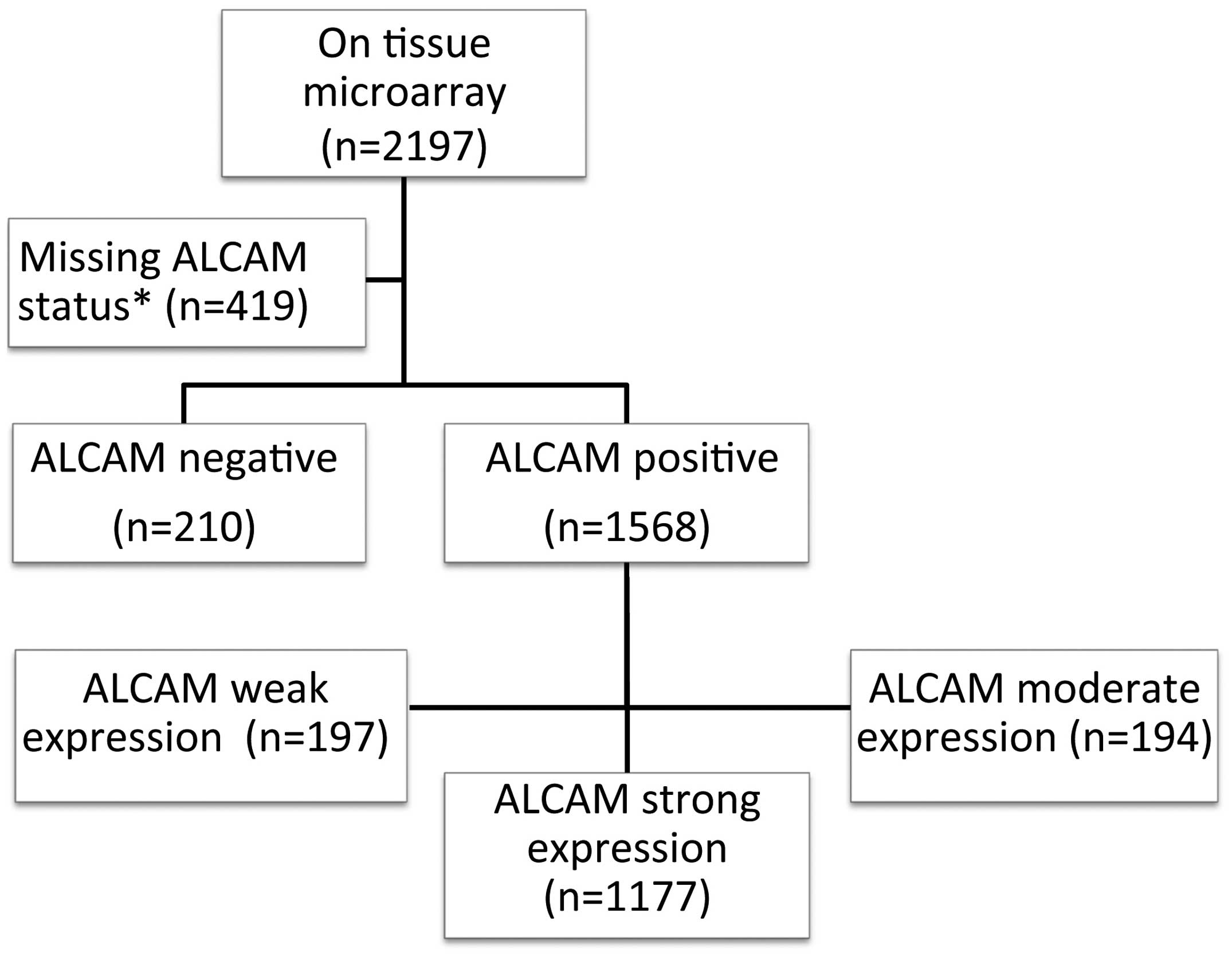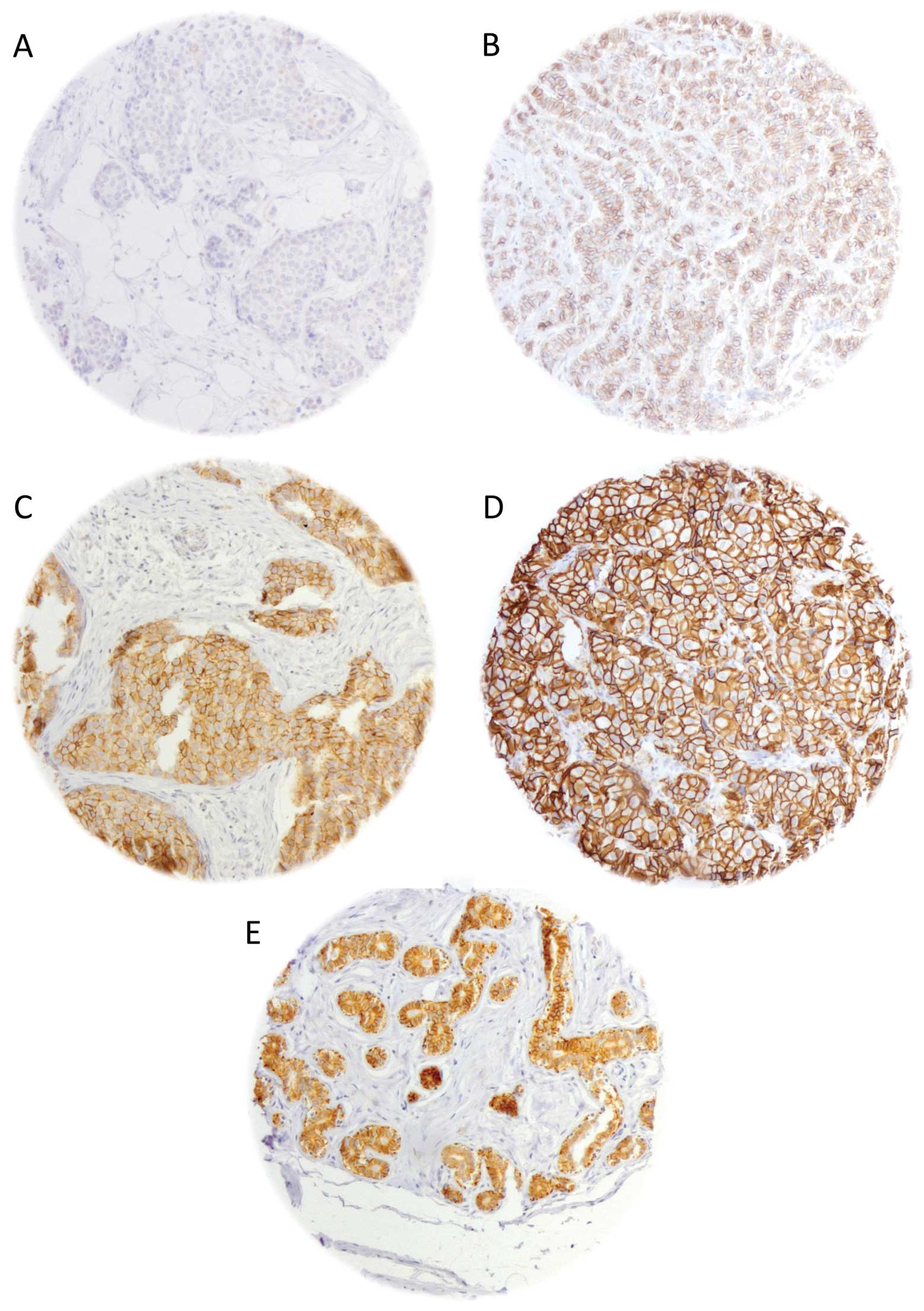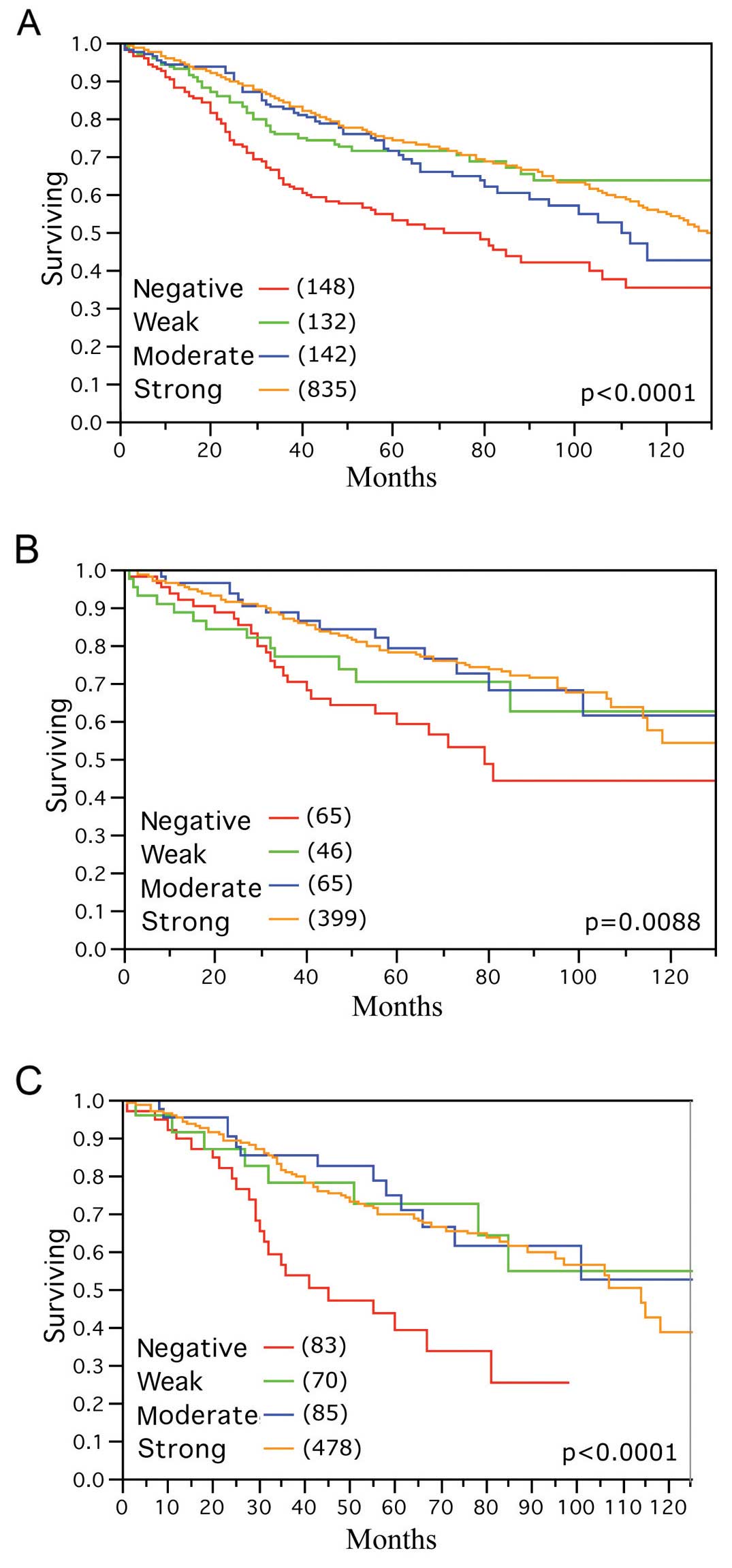|
1
|
Ohneda O, Ohneda K, Arai F, et al: ALCAM
(CD166): its role in hematopoietic and endothelial development.
Blood. 98:2134–2142. 2001. View Article : Google Scholar : PubMed/NCBI
|
|
2
|
Masedunskas A, King JA, Tan F, et al:
Activated leukocyte cell adhesion molecule is a component of the
endothelial junction involved in transendothelial monocyte
migration. FEBS Lett. 580:2637–2645. 2006. View Article : Google Scholar : PubMed/NCBI
|
|
3
|
Swart GW: Activated leukocyte cell
adhesion molecule (CD166/ ALCAM): developmental and mechanistic
aspects of cell clustering and cell migration. Eur J Cell Biol.
81:313–321. 2002. View Article : Google Scholar : PubMed/NCBI
|
|
4
|
Degen WG, van Kempen LC, Gijzen EG, et al:
MEMD, a new cell adhesion molecule in metastasizing human melanoma
cell lines, is identical to ALCAM (activated leukocyte cell
adhesion molecule). Am J Pathol. 152:805–813. 1998.PubMed/NCBI
|
|
5
|
van Kempen LC, van den Oord JJ, van Muijen
GN, Weidle UH, Bloemers HP and Swart GW: Activated leukocyte cell
adhesion molecule/CD166, a marker of tumor progression in primary
malignant melanoma of the skin. Am J Pathol. 156:769–774.
2000.PubMed/NCBI
|
|
6
|
Tomita K, van Bokhoven A, Jansen C, et al:
Activated leukocyte cell adhesion molecule (ALCAM) expression is
associated with a poor prognosis for bladder cancer patients.
UroOncology. 3:121–129. 2003. View Article : Google Scholar
|
|
7
|
Weichert W, Knösel T, Bellach J, Dietel M
and Kristiansen G: ALCAM/CD166 is overexpressed in colorectal
carcinoma and correlates with shortened patient survival. J Clin
Pathol. 57:1160–1164. 2004. View Article : Google Scholar : PubMed/NCBI
|
|
8
|
Verma A, Shukla NK, Deo SV, Gupta SD and
Ralhan R: MEMD/ ALCAM: a potential marker for tumor invasion and
nodal metastasis in esophageal squamous cell carcinoma. Oncology.
68:462–470. 2005. View Article : Google Scholar : PubMed/NCBI
|
|
9
|
Kahlert C, Weber H, Mogler C, et al:
Increased expression of ALCAM/CD166 in pancreatic cancer is an
independent prognostic marker for poor survival and early tumour
relapse. Br J Cancer. 101:457–464. 2009. View Article : Google Scholar : PubMed/NCBI
|
|
10
|
Sawhney M, Matta A, Macha MA, et al:
Cytoplasmic accumulation of activated leukocyte cell adhesion
molecule is a predictor of disease progression and reduced survival
in oral cancer patients. Int J Cancer. 124:2098–2105. 2009.
View Article : Google Scholar : PubMed/NCBI
|
|
11
|
Mezzanzanica D, Fabbi M, Bagnoli M, et al:
Subcellular localization of activated leukocyte cell adhesion
molecule is a molecular predictor of survival in ovarian carcinoma
patients. Clin Cancer Res. 14:1726–1733. 2008. View Article : Google Scholar
|
|
12
|
Corrias MV, Gambini C, Gregorio A, et al:
Different subcellular localization of ALCAM molecules in
neuroblastoma: association with relapse. Cell Oncol. 32:77–86.
2010.PubMed/NCBI
|
|
13
|
Tomita K, van Bokhoven A, Jansen CF,
Bussemakers MJ and Schalken JA: Coordinate recruitment of
E-cadherin and ALCAM to cell-cell contacts by α-catenin. Biochem
Biophys Res Commun. 267:870–874. 2000.PubMed/NCBI
|
|
14
|
King JA, Ofori-Acquah SF, Stevens T,
Al-Mehdi AB, Fodstad O and Jiang WG: Activated leukocyte cell
adhesion molecule in breast cancer: prognostic indicator. Breast
Cancer Res. 6:R478–R487. 2004. View
Article : Google Scholar : PubMed/NCBI
|
|
15
|
Burkhardt M, Mayordomo E, Winzer KJ, et
al: Cytoplasmic overexpression of ALCAM is prognostic of disease
progression in breast cancer. J Clin Pathol. 59:403–409. 2006.
View Article : Google Scholar : PubMed/NCBI
|
|
16
|
Wiiger MT, Gehrken HB, Fodstad Ø,
Maelandsmo GM and Andersson Y: A novel human recombinant
single-chain antibody targeting CD166/ALCAM inhibits cancer cell
invasion in vitro and in vivo tumour growth. Cancer Immunol
Immunother. 59:1665–1674. 2010. View Article : Google Scholar : PubMed/NCBI
|
|
17
|
Hein S, Muller V, Kohler N, et al:
Biologic role of activated leukocyte cell adhesion molecule
overexpression in breast cancer cell lines and clinical tumor
tissue. Breast Cancer Res Treat. 129:347–360. 2011. View Article : Google Scholar : PubMed/NCBI
|
|
18
|
Piao D, Jiang T, Liu G, Wang B, Xu J and
Zhu A: Clinical implications of activated leukocyte cell adhesion
molecule expression in breast cancer. Mol Biol Rep. 39:661–668.
2012. View Article : Google Scholar : PubMed/NCBI
|
|
19
|
Davies S and Jiang WG: ALCAM, activated
leukocyte cell adhesion molecule, influences the aggressive nature
of breast cancer cells, a potential connection to bone metastasis.
Anti-cancer Res. 30:1163–1168. 2010.
|
|
20
|
Milde-Langosch K, Janke S, Wagner I, et
al: Role of Fra-2 in breast cancer: influence on tumor cell
invasion and motility. Breast Cancer Res Treat. 107:337–347. 2008.
View Article : Google Scholar : PubMed/NCBI
|
|
21
|
Jezierska A, Matysiak W and Motyl T:
ALCAM/CD166 protects breast cancer cells against apoptosis and
autophagy. Med Sci Monit. 12:BR263–BR273. 2006.PubMed/NCBI
|
|
22
|
Ruiz C, Seibt S, Al Kuraya K, et al:
Tissue microarrays for comparing molecular features with
proliferation activity in breast cancer. Int J Cancer.
118:2190–2194. 2006. View Article : Google Scholar : PubMed/NCBI
|
|
23
|
Elston CW and Ellis IO: Pathological
prognostic factors in breast cancer. I The value of histological
grade in breast cancer: experience from a large study with
long-term follow-up. Histopathology. 19:403–410. 1991. View Article : Google Scholar
|
|
24
|
McShane LM, Altman DG, Sauerbrei W, Taube
SE, Gion M and Clark GM; Statistics Subcommittee of NCI-EORTC
Working Group on Cancer Diagnostics. REporting recommendations for
tumor MARKer prognostic studies (REMARK). Breast Cancer Res Treat.
100:229–235. 2006. View Article : Google Scholar : PubMed/NCBI
|
|
25
|
Al-Kuraya K, Schraml P, Torhorst J, et al:
Prognostic relevance of gene amplifications and coamplifications in
breast cancer. Cancer Res. 64:8534–8540. 2004. View Article : Google Scholar : PubMed/NCBI
|
|
26
|
Kilic E, Milde-Langosch K, Müller V, Wirtz
R and Ihnen M: Expression of activated leukocyte cell adhesion
molecule in breast cancer. Predictability of the response to
taxane-free chemotherapy. Pathologe. 29(Suppl 2): S347–S352.
2008.(In German).
|
|
27
|
Ihnen M, Müller V, Wirtz RM, et al:
Predictive impact of activated leukocyte cell adhesion molecule
(ALCAM/CD166) in breast cancer. Breast Cancer Res Treat.
112:419–427. 2008. View Article : Google Scholar : PubMed/NCBI
|
|
28
|
Ihnen M, Köhler N, Kersten JF, et al:
Expression levels of activated leukocyte cell adhesion molecule
(ALCAM/CD166) in primary breast carcinoma and distant breast cancer
metastases. Dis Markers. 28:71–78. 2010. View Article : Google Scholar : PubMed/NCBI
|
|
29
|
King JA, Tan F, Mbeunkui F, et al:
Mechanisms of transcriptional regulation and prognostic
significance of activated leukocyte cell adhesion molecule in
cancer. Mol Cancer. 9:2662010. View Article : Google Scholar : PubMed/NCBI
|
|
30
|
Paik S, Shak S, Tang G, et al: A multigene
assay to predict recurrence of tamoxifen-treated, node-negative
breast cancer. N Engl J Med. 351:2817–2826. 2004. View Article : Google Scholar : PubMed/NCBI
|
|
31
|
Glas AM, Floore A, Delahaye LJ, et al:
Converting a breast cancer microarray signature into a
high-throughput diagnostic test. BMC Genomics. 7:2782006.
View Article : Google Scholar : PubMed/NCBI
|
|
32
|
Paik S, Tang G, Shak S, et al: Gene
expression and benefit of chemotherapy in women with node-negative,
estrogen receptor-positive breast cancer. J Clin Oncol.
24:3726–3734. 2006. View Article : Google Scholar : PubMed/NCBI
|
|
33
|
Sparano JA and Paik S: Development of the
21-gene assay and its application in clinical practice and clinical
trials. J Clin Oncol. 26:721–728. 2008. View Article : Google Scholar : PubMed/NCBI
|
|
34
|
Carlson JJ and Roth JA: The impact of the
Oncotype Dx breast cancer assay in clinical practice: a systematic
review and meta-analysis. Breast Cancer Res Treat. 141:13–22. 2013.
View Article : Google Scholar : PubMed/NCBI
|
|
35
|
Roth A, Drummond DC, Conrad F, et al:
Anti-CD166 single chain antibody-mediated intracellular delivery of
liposomal drugs to prostate cancer cells. Mol Cancer Ther.
6:2737–2746. 2007. View Article : Google Scholar : PubMed/NCBI
|

















